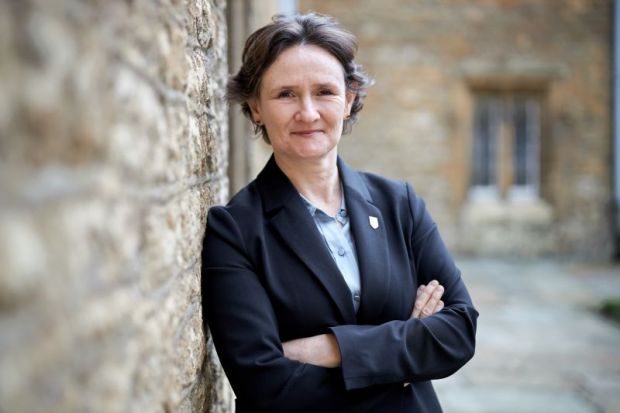The University of Oxford has looked close to home to find its next vice-chancellor, nominating neuroscientist Irene Tracey.
Professor Tracey has been warden of Merton College, Oxford, since 2019, and is pro vice-chancellor without portfolio at the university.
Although she is a relative newcomer to the top echelon of higher education leadership, she boasts deep ties with the university, where she is professor of anaesthetic neuroscience, and the city of Oxford, where she was born.
She was educated at a local state school and took her undergraduate and postgraduate degrees at the college she now leads. After a postdoctoral position at Harvard University, Professor Tracey returned to Oxford in 1997 as a founding member of the Oxford Centre for Functional Magnetic Resonance Imaging of the Brain, now the Wellcome Centre for Integrative Neuroimaging, which she was director of from 2005 and 2015. Until recently she was head of the Nuffield department of clinical neurosciences, leading a team of 550 academics.
Professor Tracey’s nomination has been approved by the university council, and subject to approval by the institution’s congregation, she will succeed Louise Richardson as vice-chancellor in 2023.
The appointment marks the first time since 1997 that Oxford has looked within its own ranks for its next leader, with the last three vice-chancellors – Sir John Hood, Andrew Hamilton and Professor Richardson – having come in from outside. Prior to the 1990s, only college heads – like Professor Tracey – were eligible to be vice-chancellor.
She will take on the top job at a time when Oxford’s reputation is at a high, following the development of the Oxford-AstraZeneca Covid-19 vaccine, credited with saving huge numbers of lives worldwide, as well as the Recovery trial of potential coronavirus treatments.
With the appointment, Professor Tracey will be stepping into one of UK higher education’s most heavily scrutinised jobs, with her predecessor – who leaves at the end of the year to become president of the Carnegie Corporation of New York – having courted headlines by using appearances at the Times Higher Education World Academic Summit series to warn that “mendacious media and tawdry politicians” were determined to undermine British universities, to defend vice-chancellors’ salaries and to say that she was “embarrassed” that Oxford had educated Cabinet minister Michael Gove.
But her long tenure at Oxford means Professor Tracey is likely to be well placed to navigate the decentralised politics of the collegiate system, seen as one of the key challenges facing a leader of the university. Professor Richardson spearheaded a “One Oxford” agenda to support closer collaboration between the central offices and the 39 colleges, which are independent and self-governing.
Meanwhile, Professor Tracey boasts scientific credentials of the highest order, having won a string of awards for her research, which focuses on pain perception and relief within the human nervous system. She is president-elect of the Federation of European Neuroscience Societies.
Professor Tracey said that she was “delighted” to “have the chance to further give back to a university that I ardently believe in, and to my home city that I dearly love”.
“The last few years have reminded us all of the crucial role Oxford, along with other leading British universities, plays in tackling global societal issues. That is why I am deeply committed to growing Oxford’s impact through supporting its ground-breaking discovery research, its excellence in teaching and its drive to create a global innovation powerhouse,” Professor Tracey said.
“The university has also made significant strides in recent years to becoming a more diverse community…Oxford’s commitment to attracting the very best students from whatever their background will remain steadfast.”
Lord Patten of Barnes, Oxford’s chancellor, hailed Professor Tracey’s journey from a local comprehensive to the university’s top job as “an extraordinary story of personal achievement, social mobility and academic excellence”.
“I doubt whether anyone knows more about the university and all its aspects than today’s warden of Merton. She also, as an internationally recognised scientist, has considerable experience at home and abroad. I am sure she will build successfully on the outstanding achievements of Louise Richardson and lead Oxford in coping with the big challenges which lie ahead,” Lord Patten said.
The term of office of an Oxford vice-chancellor is for seven years. Professor Tracey’s appointment comes as the University of Cambridge also searches for a new leader, ahead of the departure of Stephen Toope.
Register to continue
Why register?
- Registration is free and only takes a moment
- Once registered, you can read 3 articles a month
- Sign up for our newsletter
Subscribe
Or subscribe for unlimited access to:
- Unlimited access to news, views, insights & reviews
- Digital editions
- Digital access to THE’s university and college rankings analysis
Already registered or a current subscriber? Login







